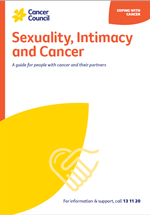- Home
- About Cancer
- Managing side effects
- Sexuality, intimacy and cancer
- Overcoming specific challenges
- Changes to the vagina
Changes to the vagina
Cancer treatments may cause temporary or permanent vaginal changes. Surgery may shorten the vagina, and pelvic radiation therapy can narrow the vagina, causing thinning of the walls and dryness. Penetration may become difficult and painful. A vaginal dilator may help.
Some people experience tight vaginal muscles (vaginismus) after cancer treatment. This is often caused by fear of painful penetration. Ask your health care team for a referral to a pelvic health physiotherapist, who can help you learn how to relax the pelvic muscles during penetration.
After cancer treatment, you may need vaginal moisturisers and lubricants to avoid discomfort during penetration.
Learn tips for coping with these vaginal changes.
Using vaginal dilators

A vaginal dilator can help keep your vagina open after treatment. A tube- shaped device made from plastic or silicone, the dilator is inserted into the vagina for short periods of time to gradually widen the entrance and prevent the walls sticking together. Dilators come in a range of sizes.
You usually start with a short and thin one and “work up to” a longer, wider one over a period of time. It’s important to use dilators regularly for them to work. Vaginal dilators are not for everyone and they can be painful. If you don’t have penetrative sex, you may not worry about using one. Talk to your doctor about the benefits – for some people it’s worth it, and for others it may not be. Ask your health care team for a referral to a pelvic health physiotherapist.
You can call Cancer Council 13 11 20 and ask to speak to someone who has used a vaginal dilator before.
→ READ MORE: How to cope with changes to the vagina
Podcast: Sex and Cancer
Listen to more of our podcast for people affected by cancer
More resources
Dr Margaret McGrath, Head of Discipline: Occupational Therapy, Sydney School of Health Sciences, The University of Sydney, NSW; Yvette Adams, Consumer; Dr Kimberley Allison, Out with Cancer study, Western Sydney University, NSW; Andreea Ardeleanu, Mental Health Accredited Social Worker, Cancer Counselling Service, Canberra Health Service, ACT; Kate Barber, 13 11 20 Consultant, Cancer Council Victoria; Dr Kerrie Clover, Senior Clinical Psychologist, Psycho-Oncology Service, Calvary Mater Newcastle, NSW; Maree Grier, Senior Clinical Psychologist, Royal Brisbane and Women’s Hospital, QLD; Mark Jenkin, Consumer; Bronwyn Jennings, Gynaecology Oncology Clinical Nurse Consultant, Mater Health, QLD; Dr Rosalie Power, Out with Cancer study, Western Sydney University, NSW; Dr Margaret Redelman OAM, Medical Practitioner and Clinical Psychosexual Therapist, Sydney, NSW; Kerry Santoro, Prostate Cancer Specialist Nurse Consultant, Southern Adelaide Local Health Network, SA; Simone Sheridan, Sexual Health Nurse Consultant, Sexual Health Services – Austin Health, Royal Talbot Rehabilitation Centre, VIC; Prof Jane Ussher, Chair, Women’s Heath Psychology and Chief Investigator, Out with Cancer study, Western Sydney University, NSW; Paula Watt, Clinical Psychologist, WOMEN Centre, WA.
View the Cancer Council NSW editorial policy.
View all publications or call 13 11 20 for free printed copies.
Need to talk?
Support services
Coping with cancer?
Speak to a health professional or to someone who has been there, or find a support group or forum
Life after cancer treatment
Webinars, exercise and nutrition, sexuality programs, and back-to-work support
Cancer information
Your coping toolbox
Strategies for managing difficult situations during and after cancer treatment
View our publications
Guides and fact sheets for people with cancer, their families and friends

